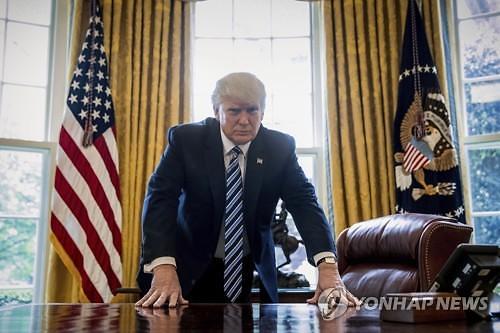
[AP/Yonhap News Photo]
US President Donald Trump aims to pressure North Korea into dismantling its nuclear and missile programs through economic sanctions and diplomatic measures while remaining open to negotiations, top US officials said in a rare joint statement Wednesday.
"North Korea's pursuit of nuclear weapons is an urgent national security threat and top foreign policy priority. Upon assuming office, President Trump ordered a thorough review of US policy pertaining to the Democratic People's Republic of Korea (DPRK)," Secretary of State Rex Tillerson, Secretary of Defense James Mattis and Director of National Intelligence Dan Coats said in a joint statement.
"Today, along with Chairman of the Joint Chiefs of Staff Gen. Joe Dunford, we briefed members of Congress on the review. The president's approach aims to pressure North Korea into dismantling its nuclear, ballistic missile, and proliferation programs by tightening economic sanctions and pursuing diplomatic measures with our allies and regional partners," the statement said.'
The statement was issued after the officials held a highly unusual briefing on North Korea policy for all 100 senators at the White House in a move that underlines the urgency and seriousness the Trump administration attaches to the problem. A similar briefing was held on Capitol Hill for members of the House of Representatives.
It is unprecedented for the White House to hold such a special briefing for the Senate about a single foreign policy problem. It is also believed to be the first time that such top U.S. security officials have issued a joint statement on North Korea.
The statement said that past efforts have failed to halt North Korea's unlawful weapons programs and nuclear and ballistic missile tests, adding that with each provocation, North Korea jeopardizes stability in Northeast Asia and "poses a growing threat to our allies and the US homeland."
What also stands out is the emphasis on the need for dialogue with the North as well as the lack of any mention or suggestion of the possibility of military action, such as the phrase "all options are on the table."
"We are engaging responsible members of the international community to increase pressure on the DPRK in order to convince the regime to de-escalate and return to the path of dialogue. We will maintain our close coordination and cooperation with our allies, especially the Republic of Korea and Japan, as we work together to preserve stability and prosperity in the region," it said.
"The United States seeks stability and the peaceful denuclearization of the Korean peninsula. We remain open to negotiations towards that goal. However, we remain prepared to defend ourselves and our allies," the statement said.
Even a mention of dialogue with the North can be considered a big change for the tough-talking Trump administration. During a visit to South Korea last month, Tillerson even said that two decades of diplomatic efforts to disarm the North have failed, and there was no point in pursuing the diplomatic path any longer. He also said that the US was considering a wide range of options, including the use of military force.
The new policy does not appear much different from that of former President Barack Obama, known as "strategic patience," which centered on waiting for Pyongyang to show good faith and return to denuclearization talks while increasing sanctions and pressure on the regime.
That illustrates the grim reality that other than imposing tougher sanctions and strengthening deterrence and defensive measures against the provocative regime, there's not much the US can do about it that does not risk a war.
Differences from Obama's North Korea policy, if any, would likely be the level of appeal and pressure the US puts on China to exercise more of its leverage as the North's main food and energy provider to rein in the provocative regime in Pyongyang.
Since his first summit meetings with Chinese President Xi Jinping earlier this month, Trump has repeatedly praised China for trying to increase pressure on the North while at the same time holding out the prospect of a better trade deal with the US if China solves the problem.
(Yonhap)
Copyright ⓒ Aju Press All rights reserved.



